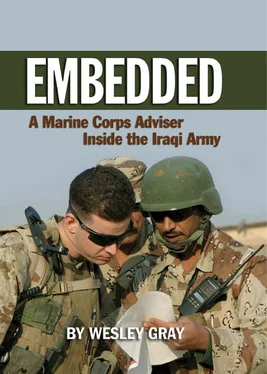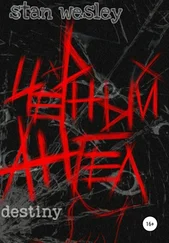The night after the helicopter crash I lay in bed and listened to the rescue helicopters searching for our fallen comrades in the lake. They began moving search efforts to the Euphrates River, thinking the bodies had gone through the dam. It was heart wrenching and surreal to listen to the helicopters buzz overhead as we tried to sleep, but it was also comforting. We knew the Marines would recover the fallen no matter what the cost or inconvenience.
When they couldn’t find the bodies from the air, the Marines took some very drastic measures in order to find them: they shut down the dam and drained the Euphrates. The site was breathtaking. There were a few things I was sure I’d never witness in my lifetime: the parting of the Red Sea, Africa taking over the world economy, and the draining of the great Euphrates River. To see the two-hundred-meter river, the lifeblood of civilization, driven to a small stream was a spectacle. I’m sure there were quite a few Iraqis in Fallujah and Baghdad who were wondering what was going on upstream.
The helicopter crash story had even made the news on CNN. The official report noted four confirmed dead and ten survivors, which jibed with what we had been hearing from the Marines in the dam. While it was absolutely tragic for the four men who died, I was very thankful ten men had survived. When I first heard of the crash, I thought for sure there would be no survivors given the unforgiving conditions of Lake Qadisiyah.
Later I got a firsthand look at how ridiculous the Arab media is—and at the same time I realized that our own media was not that far ahead. The Arab media reported that there was a possibility the helicopter had been shot down by insurgent gunfire and that thirty Marines may have died in the incident. Their evidence came from some Haditha resident who claimed to have seen a flyer posted on a Haditha mosque by a member of the Islamic state of Iraq. What a bunch of bullshit.
Our media reporting wasn’t much better. Our own highly respected newspaper, the Washington Post , published buffoonery. In a press release dated December 5, 2006, Nancy Trejos, a Washington Post staff writer, wrote a couple of absurd things. First, she claimed that the mayor of Haditha, Ibraheem al-Bayati, said the helicopter had been shot down by insurgents with machine-gun fire as it was taking off from town. This was impossible because before the crash the mayor of Haditha had been sent to Abu Ghraib for being an insurgent. I guess Trejos interviewed him from prison to get his expert opinion on an event that happened in Haditha. Ridiculous.
Trejos then made another absurd claim—that an Iraqi army officer named Lt. Hussein Muslih was making the same claims as this Ibraheem al-Bayati character. This was equally absurd. I was the S-1 adviser to our Iraqi battalion and I have asked every Iraqi officer and looked through every administration roster for the past year—there is no evidence that anyone with the name Hussein Muslih ever existed. Moreover, I had the Iraqis check with the brigade, and they said there was no such officer in the entire brigade. This means that this Washington Post writer either made stuff up or cut and pasted propaganda from the Islamic State of Iraq’s website and claimed the site’s work as her own. The amount of lying, misinformation, and false claims in the Arab media—as well as in our very own—is appalling.
As if all this weren’t bad enough, one day in December I woke up to a group of bomb sniffing dogs searching around the MiTT camp. Apparently Colonel Abass had heard rumors that many of the jundi were also in the Mahdi army. He had been catching jundi bringing in bits of explosives. Perhaps he thought that they were assembling some sort of explosive device piece by piece and that it would be wise to investigate the camp for safe measure. I swear this place gets crazier and crazier every single day. Tension just fills the air.
When it seems things cannot get any worse, they sometimes do. I knew my wife had been struggling during my absence. I spoke with her on the phone and found that she was officially clinically depressed. I was proud of her for telling me the truth and proud of her for going to the doctor to get drugs and counseling, but her timing was not impeccable. Her news came when Marines were dying all around me and big issues were at hand. I wished I was there to help her out. Or at minimum, I wished things weren’t quite so terrible in Iraq so I’d have more time to talk to her. It was just one more thing to add to the list of shit that was going wrong around me.
Chapter 23
Light at the End of the Tunnel?
Late December 2006–January 2007
Things had to change. All I seemed to see and hear was bad news. I wanted to see something positive, but it just wasn’t happening. I was curious to hear what the news back home had to say about the situation. Actually, I already knew without even watching: Fox News thought things were going great, and CNN thought things were falling off a cliff into oblivion. At least our media had their bets hedged.
Today we came together as a MiTT and decided on the future of our Iraqi battalion. Everyone agreed that because our numbers had dropped so dramatically it made sense to consolidate. Major Pyle agreed to ask higher headquarters if we could consolidate all the jundi in the Triad and bring them to Camp Ali. I thought it was a good short-term solution. Longer term, the only way to be successful was to get more soldiers.
The MiTT members were not the only ones thinking strategically. 2/3 had been drawing up some dramatic plans in an effort to stop the rampant violence in the area. It planned on digging huge trenches and building earthen berms around the Triad cities. Also, they intended to outlaw all nonessential vehicle traffic and create single entry and exit areas into each of the Triad population centers. Once the villages were contained, they would systematically purge each area of insurgents. In essence they were implementing martial law.
At face value the 2/3 plan seemed like a great idea, at least for the short term. 3/1, the Marine battalion that was caught up in the so-called Haditha Massacre, did the exact same thing during Operation River Gate and ended up having a relatively peaceful deployment.
Signs of Hope in the Triad?
2/3’s counterinsurgency-control measures were working wonders. The vehicle traffic ban, entry and exit checkpoints, and the berms around the towns caused insurgent activity to plummet. On the flip side these rules also made normal life in the Triad a near impossibility. Teachers could no longer get to school, the cost of everyday goods like food and gas went through the roof, smuggling rings popped up throughout the Triad, and visiting relatives in a nearby area became impossible.
While all the Triad villages showed progress, Haditha’s success was the brightest. Haditha had been the hottest place in all of Iraq, with an average of thirty to forty attacks a week. Now there were one to two a week. Additionally, Haditha’s all-girls school was back open, women were now walking around the streets without burkhas, shops were reopening throughout town, and there was a renewed sense of hope in the area. All of this was compelling. Only two weeks earlier we had been living in complete Armageddon. The reduction in violence was the best Christmas gift we could ever have received.
Political Reconciliation Stalled
Despite appearances it seemed the Iraqis were not on track for success (at least as the West sees it). They probably never will be successful. Not until their entire culture changes. I wish I could say something more positive about the situation, but I can’t. I’ve seen the man behind the curtain pulling the strings.
Читать дальше












